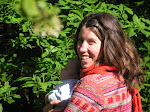 The ‘act’ of repatriation is well behind us. The stories of those who are still global – but no longer living a mobile life – are a collective of voices relatively unrepresented. We are
the quiet ones for whom ‘repatriation’ happened a long long while ago.
The ‘act’ of repatriation is well behind us. The stories of those who are still global – but no longer living a mobile life – are a collective of voices relatively unrepresented. We are
the quiet ones for whom ‘repatriation’ happened a long long while ago. That doesn’t mean we are done or feel comfortable or entirely at peace with our lives in our passport country. Ruth van Reken answers that question simply: “When do we adjust to repatriation? We never adjust. We adapt.”
Global Minus the Mobile
So where are our stories? How have we adapted? 'We' being the-global-without-the-mobile?
Like me, you might never have lived in your passport country until you were 18. And like me, your path likely followed a unique set of sequences that landed you, well – landed in your passport country as an adult.
That belief that we are the TCKs who chose stability and rooting? This story does not necessarily represent us.
We are those who ‘returned’ and through the quick-sand of circumstance, remain. There is pleasure and love for my life here. And still, a certain sadness. The Families in Global Transitions conference awoke me to my false sense of aloneness in an experience within the global community: the voices of those of us who are STILL globals, those who are not currently mobile... we have a place at the table too.
We carry a different form of grief – not better or more or less – just different than other groups of globals: the TCKs-turned-expats, the trailing spouses, the freshly repatriated. We are the-STILL-globals and we need a place to tell our stories too.
#globalminusthemobile
Sarah
Stoner is an American-born writer who was raised in Uganda, Morocco, Belgium,
and Thailand. Her descriptive nonfiction has appeared in a variety of local
magazines and national journals as well as the anthology The Chalk Circle: Intercultural
Prizewinning Essays (a Skipping Stones
Honor Award Book). Recognition for her work includes first place in the
National League of American Pen Women essay contest
and selection as a featured author for the City of Seattle Office of
Arts and Cultural Affairs project, TreeStory. Her family’s roots run four generations deep in the Pacific Northwest where she now lives—on a 20-acre land trust property with her husband and two children. With half her life spent navigating foreign soils and various cultures, Sarah is learning the language of living in her passport country. She explores identity and belonging at sarahhhwho.blogspot.com.






